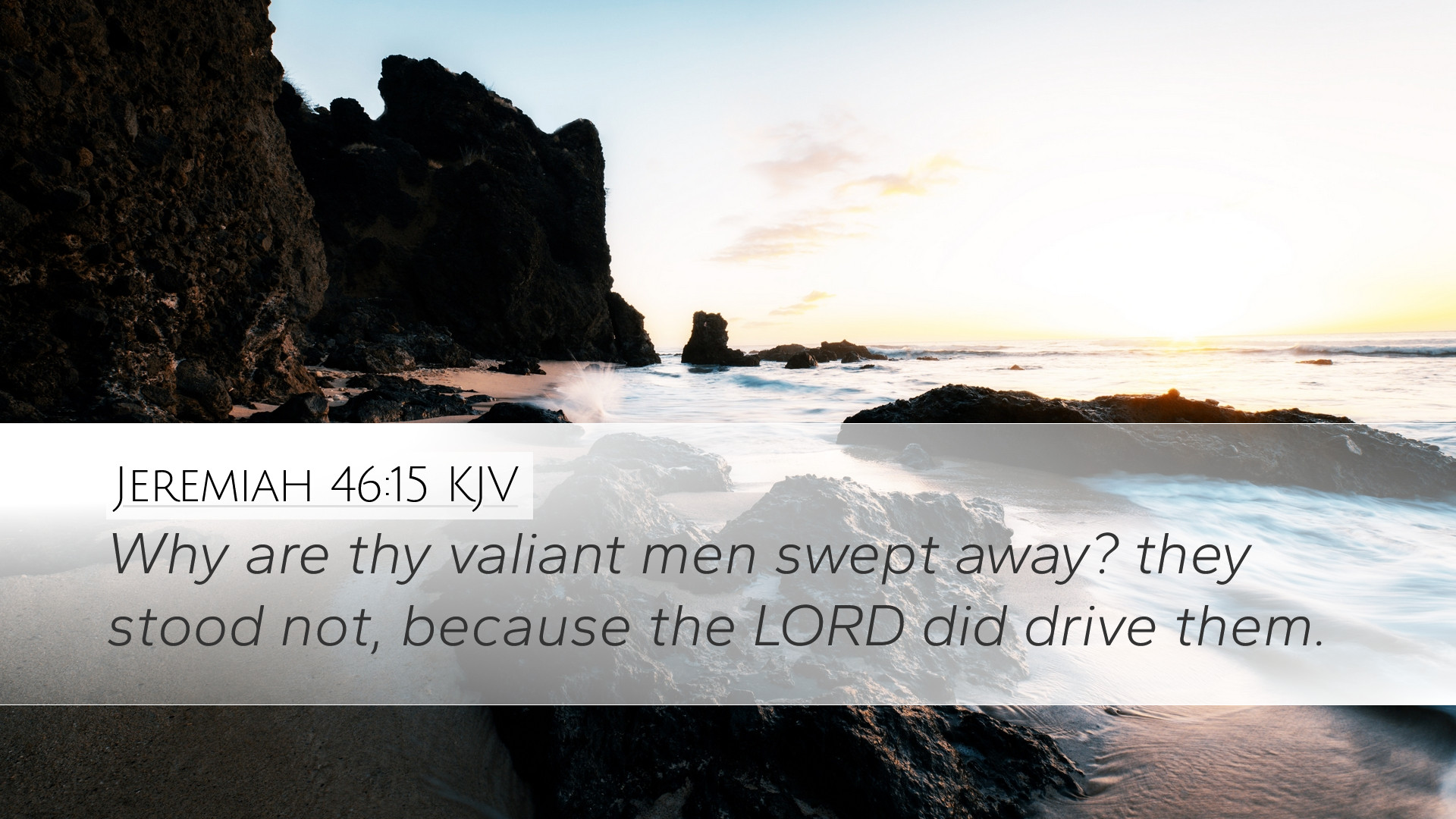Commentary on Jeremiah 46:15
Jeremiah 46:15 states: "Why are thy valiant men swept away? they stood not, because the LORD did drive them." This verse serves as a poignant reflection on the consequences of divine judgment and the impact of God’s sovereignty over human strength. Here we delve into the insights from various public domain commentaries to explore its theological significance.
Contextual Background
Jeremiah, often known as the weeping prophet, addresses the fate of nations in these prophetic writings. Chapter 46 specifically pertains to the prophecy against Egypt, particularly its military forces. As Jerusalem faced threats from Babylon, Jeremiah sought to convey God’s message not just to Israel but also to surrounding nations. The context of this verse highlights the futility of relying on human might and the inevitability of God’s judgment.
The Meaning of "Valiant Men"
The term “valiant men” indicates those who are strong and courageous, displaying valor in the face of conflict. Albert Barnes notes that these are not merely soldiers but represent the very essence of military prowess and national pride. When such individuals are rendered ineffective, it signifies a dramatic shift in the power dynamics, illustrating the lost confidence in human capabilities in the face of God’s sovereignty.
The Role of Divine Intervention
Matthew Henry posits that the verse emphasizes that it is the LORD who drives away the valiant men. Thus, the heart of the commentary lies in understanding God’s active role in determining the outcomes of human endeavors. The Lord’s will is sovereign, and His decisions can dismantle the mightiest armies. This reality serves as a reminder of the ultimate authority of God over all nations.
Reflection on Human Agency
In examining the idea that “they stood not,” several commentators reflect on the struggle between divine sovereignty and human agency. Adam Clarke suggests that these men may have had the strength and skill, but without God’s favor, their efforts were in vain. This speaks to the theological point that while humans possess free will and capabilities, they are ultimately subject to divine orchestration.
Theological Implications
- Dependence on God: This passage invites believers to assess their reliance on worldly strength and military might. In contemporary application, this translates to how communities and nations place their trust in fluctuating political circumstances rather than divine counsel.
- Understanding Judgment: The prophecy serves as a reminder of God’s coming judgment, highlighting the consequences of sin and rebellion against God. For the faithful, it affirms the necessity of repentance and returning to God to seek His mercy.
- Historical Lessons: For historians and theologians, the fate of Egypt serves as a case study illustrating the rise and fall of nations under divine providence. It prompts reflection on contemporary nations and their alignment with God’s purposes.
Practical Applications
For pastors and leaders, the message of Jeremiah 46:15 can guide sermons and teachings on the importance of humility before God. It encourages the faithful to recognize that true strength lies in spiritual reliance on God rather than in material or military prowess. It resonates with the truth that even the mightiest can be brought low by God’s hand, urging congregations to seek divine strength through prayer and supplication.
Conclusion
In summary, Jeremiah 46:15 encapsulates profound insights into the nature of divine sovereignty and human vulnerability. As commentators like Henry, Barnes, and Clarke elucidate, this verse serves as an essential reminder that while humanity may put forth its best efforts, it is ultimately God who determines the outcomes of nations and peoples. The call to align with God’s will remains ever relevant. As students, scholars, and theologians engage with this text, they uncover layers of meaning that speak to both ancient contexts and current realities, enriching our understanding of God's justice and mercy.


